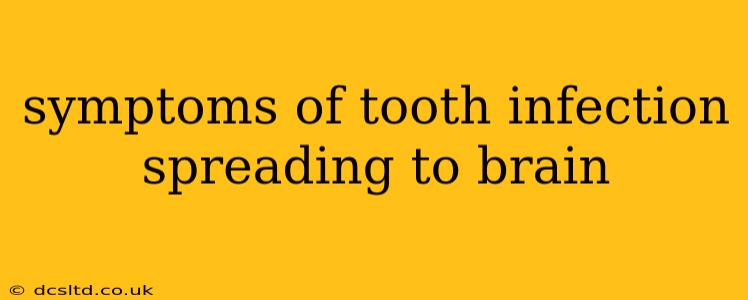A tooth infection, if left untreated, can be far more dangerous than just a painful toothache. In severe cases, the infection can spread to the brain, a life-threatening condition known as a brain abscess. Recognizing the symptoms early is crucial for prompt medical intervention and potentially saving a life. This article will explore the warning signs of a tooth infection progressing to the brain, as well as address frequently asked questions surrounding this serious complication.
What are the Symptoms of a Tooth Infection?
Before delving into the signs of brain involvement, let's first understand the typical symptoms of a tooth infection (also known as an abscess or dental infection). These can include:
- Severe, persistent toothache: This pain may radiate to other areas of the face.
- Swelling and redness of the gums: The gums around the affected tooth may be inflamed and tender to the touch.
- Sensitivity to hot and cold temperatures: Your tooth may be unusually sensitive to changes in temperature.
- Pus formation: A visible collection of pus may form around the affected tooth.
- Fever and chills: A systemic infection often presents with fever and chills.
- Swollen lymph nodes: Swollen lymph nodes in the neck or jaw area may indicate a spreading infection.
- Bad breath: Persistent bad breath can be a sign of an underlying infection.
How Does a Tooth Infection Spread to the Brain?
The route of infection from the mouth to the brain is usually through the bloodstream. Bacteria from the infected tooth can enter the bloodstream and travel to the brain, where they can cause an abscess (a pocket of pus). This is a very serious complication requiring immediate medical attention. The skull's protective layers are not an absolute barrier to infection, particularly if there's already a compromised immune system.
What are the Signs a Tooth Infection Has Spread to the Brain?
Identifying the transition from a simple tooth infection to a brain infection requires vigilance. Symptoms can overlap, but the presence of neurological symptoms alongside dental infection signs should raise immediate alarm:
- Severe headache: This is often described as a persistent, intense headache unlike any previously experienced.
- Fever and high temperature: A significant and persistent fever, often accompanied by chills, is a critical warning sign.
- Neck stiffness (meningismus): Difficulty bending the neck forward due to stiffness is concerning.
- Confusion and disorientation: Mental changes, such as difficulty concentrating or memory problems, indicate a possible brain involvement.
- Seizures: Convulsions or seizures are serious neurological symptoms.
- Vision problems: Blurred vision, double vision, or other visual disturbances can be indicative of a brain infection.
- Nausea and vomiting: These symptoms can accompany both the dental infection and the brain infection.
- Loss of balance and coordination: Difficulty walking or maintaining balance.
- Changes in speech or language: Difficulties in speaking or understanding language.
- Loss of consciousness: Fainting or a prolonged period of unconsciousness.
It's crucial to note that not everyone experiencing a toothache will develop a brain infection. However, ignoring the symptoms of a tooth infection dramatically increases the risk.
What Happens if a Tooth Infection is Left Untreated?
Untreated dental infections can lead to severe complications including:
- Cellulitis: A serious bacterial skin infection.
- Osteomyelitis: Infection of the bone surrounding the tooth.
- Cavernous Sinus Thrombosis: A serious blood clot in the brain.
- Brain Abscess: A collection of pus within the brain tissue. This is a life-threatening condition requiring immediate surgical drainage and antibiotic treatment.
How is a Brain Infection from a Tooth Treated?
Treatment for a brain infection originating from a dental source typically involves a combination of:
- Antibiotics: High-dose intravenous antibiotics are essential to combat the bacterial infection.
- Surgical drainage: Surgical intervention may be necessary to drain the brain abscess and remove infected tissue.
Can a Tooth Infection Spread to the Brain in Children?
Yes, children are also susceptible to a tooth infection spreading to their brains. Because their immune systems might be less developed, they may be at a higher risk of developing serious complications. Prompt diagnosis and treatment are critical in pediatric cases.
When Should I Seek Immediate Medical Attention?
If you experience any of the symptoms mentioned above, especially those indicative of a neurological problem, seek immediate medical attention. Do not delay; prompt diagnosis and treatment are crucial for a favorable outcome. This is a life-threatening condition, and timely medical intervention can be the difference between recovery and a devastating outcome. Don't hesitate to go to the emergency room or call emergency services.
Disclaimer: This information is intended for educational purposes only and should not be considered medical advice. Always consult with a qualified healthcare professional for any health concerns or before making any decisions related to your health or treatment.
